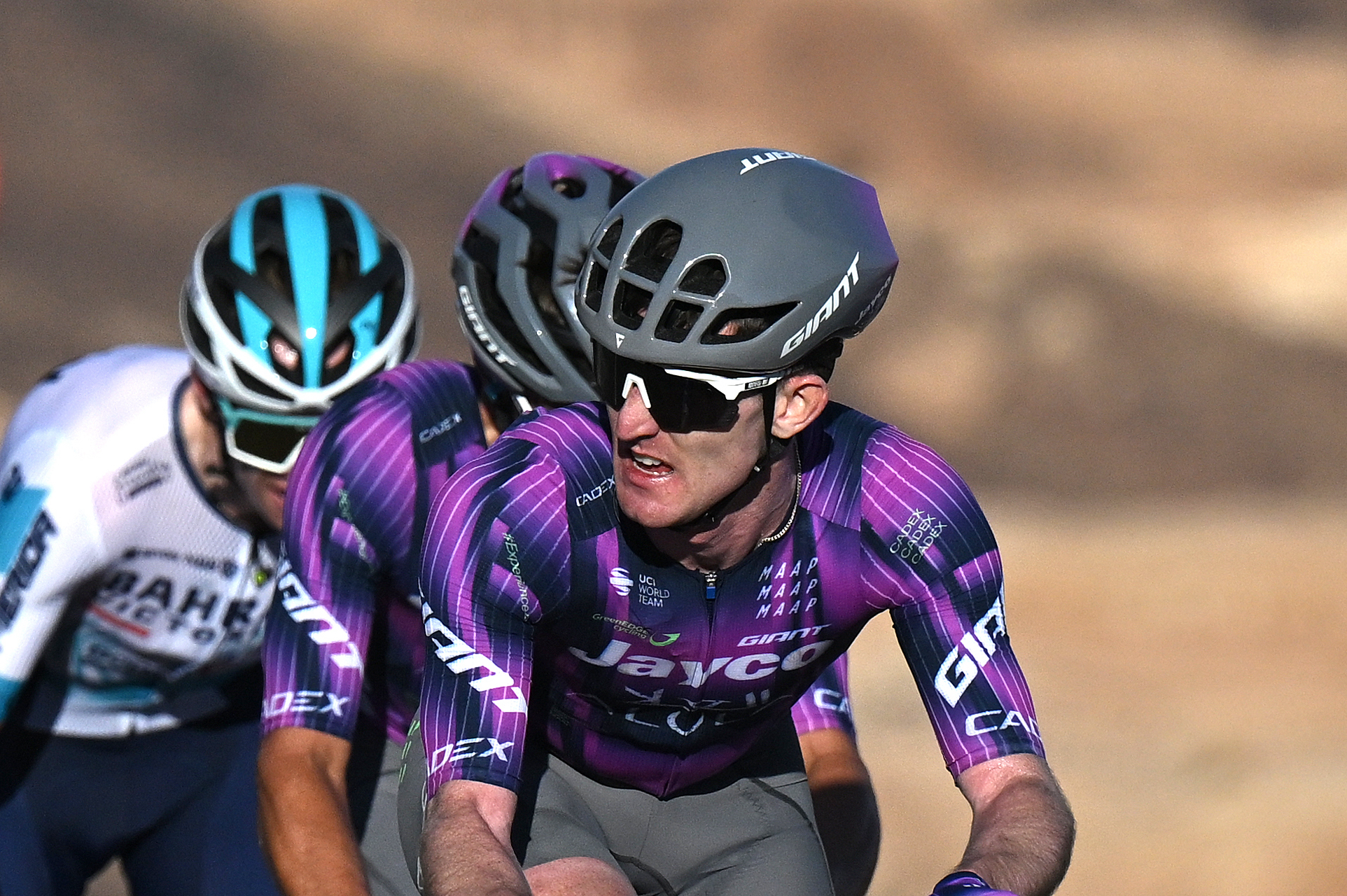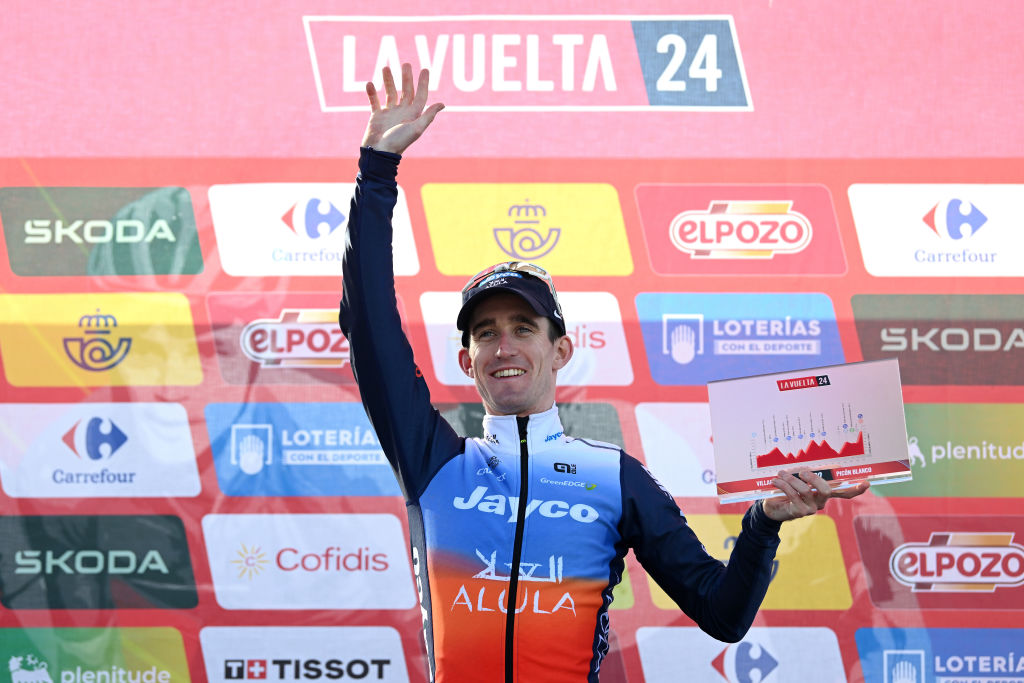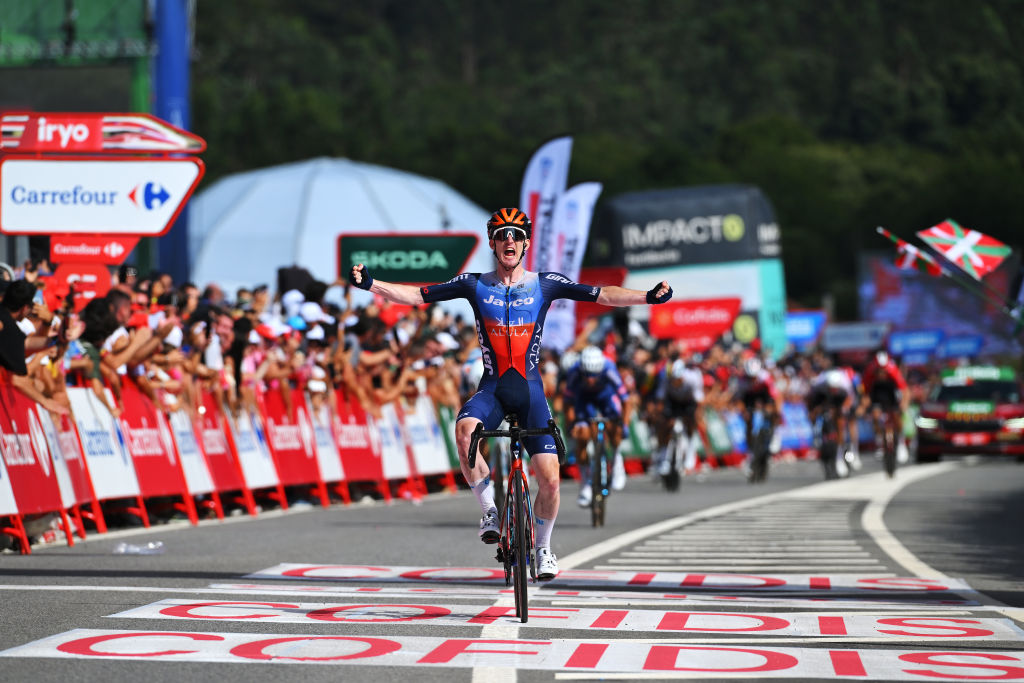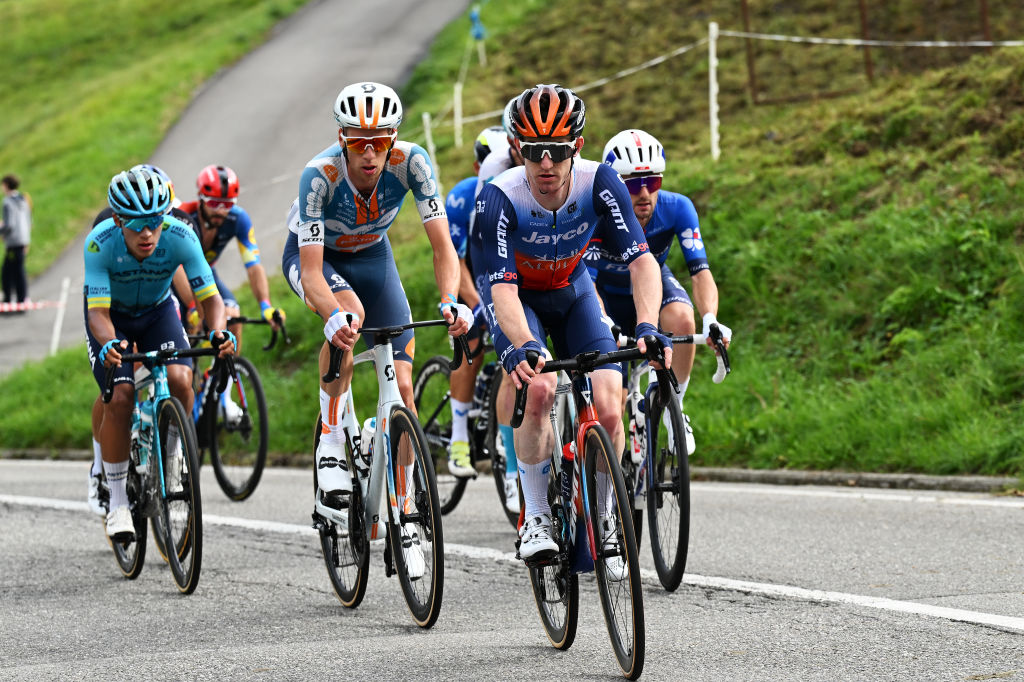'You want to make winning a habit' - after 2024 triumphs, Eddie Dunbar aims to raise his Grand Tour ambitions even higher
Double 2024 Vuelta a España stage winner eyes Tour de France debut in 2025

When Eddie Dunbar is asked if there was one thing he'd like to have from new Jayco-AIUIa teammate Ben O'Connor's skillset and use for himself, he doesn't take too long to answer.
"I noticed in the 2024 Vuelta he's very good at positioning himself on the climbs," Dunbar tells Cyclingnews.
"A lot of the top climbers are good at doing that, they don't waste any energy, it makes a big difference - not having to ride for five minutes at the bottom at whatever power it is."
"When you want to take every possibility of winning at a bike race, you have to be in the right position. Ben did that really well in the Vuelta and it almost paid off in the end."
If O'Connor's perspicacity at being in the right place at the right time paid dividends at the Vuelta, it's also true that the Spanish Grand Tour also represented a major breakthrough for Dunbar.
He won his first Grand Tour stages. And not just any old stages either. His first was in a fraught, Classics-style second-week race across the hills of Galicia, storming away in the final 600 metres from a reduced pack and keeping them at distance all the way to the line. The second was the toughest mountain stage of the entire Vuelta, with a solo late blast for glory at the Picón Blanco summit, on a day with over 5,000 metres of vertical climbing.
Like O'Connor, Dunbar is firmly committed to building on that major advance in 2025.
First and foremost, he'll likely be making his long anticipated - and long overdue - first participation in the Tour de France this summer. After a top 10 finish in the Giro d'Italia back in 2023 and his double triumph in Spain last autumn, it's time to head to the biggest Grand Tour of them all.
Get The Leadout Newsletter
The latest race content, interviews, features, reviews and expert buying guides, direct to your inbox!
"A lot can change between now and then but I'll be ready for the Tour," Dunbar says.
"It hasn't been finalised, but I imagine I'd go there and support Ben - he's been fourth in the Giro and Tour, second in the Vuelta."
"The Tour's a race where you need support far into the mountains, and maybe if I have the opportunity to go for a stage, it would be nice to get a chance to do that - I'll go for it, make the most of it."
Racing his first Tour de France at 28 is much later than Dunbar would perhaps have liked, but it's not been through any fault of his own.
When his first big opportunity arose in 2021 with Ineos, he was rather inexplicably left off the roster, despite having supported then teammate Richard Carapaz to the hilt as the Ecuadorian closed in on victory in the warm-up Tour de Suisse. Carapaz' glaring lack of team mountain support in the Tour de France that summer only underlined the bizarreness of that line-up decision.
Then in 2022, with Dunbark's exit from Ineos already sure, he was consigned to racing and winning on the minor league circuit at the Settimana Coppi e Bartali and the Tour of Hungary.
A subsequent seventh overall in the 2023 Giro d'Italia despite a bout of illness in the third week for Jayco was yet more evidence Ineos had somehow underestimated his aptitude for bigger challenges.
'It's not such a bad perspective to have'

Fast forward 18 months to the 2025 Tour. Dunbar is keen to take part in the Tour and so has no objection to acting as a Plan B to O'Connor this July.
"Everyone knows the Tour is stressful enough as it is, so to go there and start it is a big thing, anyway," he argues.
"I'll go there, perform and do the best for the team, help Ben fight for a podium: which he's more than capable of doing."
The question of what Dunbar himself is capable of doing in cycling's top event is also on the radar, though, particularly as the second half of 2024 was such a big step forward for the rider from north Cork.
His double Vuelta success also came at the end of a spell of extreme bad luck and misfortune, starting with that illness very late in the 2023 Giro d'Italia that saw him move out of a top-five position to seventh with 24 hours remaining.
Then came the same unwelcome triage of crash, injuries and abandon in the first week of the 2023 Vuelta a España, stage 2 of the 2024 UAE Tour and yet again on stage 2 of the Giro d'Italia. Basically, he just couldn't catch a break.
The 2024 Vuelta put Dunbar back in the big league and is a tribute, amongst other things, to his resilience after so many sucker punches. So much so, in fact, that after a point where he even doubted whether he might go the distance in pro cycling.
"I thought I might not have a future in the sport" he said at the Vuelta last year, but his glass for 2024 ended up definitely being, as he puts it: "Half-full."
"The end of the season was really good and it gave me confidence that I can compete in the WorldTour. As long as I get a good run, a good period of training and a good period of racing I know I can be competitive. I always said that in my career since I started and that hasn't changed."
"I probably do have a different perspective to most riders, I've had some bad crashes and setbacks and when things are good they are good. But they can change very easily."
"It's not like I think like that all the time - I don't. But I think knowing how to handle those situations when they do happen is a good thing for life in general, not just in terms of cycling."
"I think those moments can make you a bit stronger. So it's not such a bad perspective to have."

Shifting gears
Cycling is a sport with so many twists of fate and changes of direction sometimes it hardly feels fair to confront bike riders with their own comments or self-analysis from earlier in their careers.
Before 2023's ill-fated Giro d'Italia Cyclingnews had asked Dunbar how he viewed his possible progress in the sport and he'd answered simply "I need to back myself more." And to ask the same question now, is 'backing himself more' the way to go from here, too?
"I hadn't done that for a while but in both stages I won in the Vuelta I backed myself, it paid off," Dunbar recognises.
"That doesn't always happen in cycling, but if you can be smart and pick your moments and back yourself, you get rewarded for it."
"The Vuelta just kind of reiterated - right, I do know what I'm doing, I haven't been in that situation too many times, but when I am, I can win from it. And that's the main thing."
"So that's something I will take into 2025 - not being afraid to lose and winning is important in this sport, you get a good feeling off it, and you want to make it a habit. It's addictive."

A domino effect
That the morale gained by one breakthrough win can quickly provide momentum for a second is a sporting cliché as old as it's true.
As Dunbar agrees, the fact that his two Vuelta victories came in such different settings - one, a Classics-style stage, the second a classic third-week summit finish - certainly has given him an extra spring in the legs for 2025.
"I remember when I was growing up, everyone used to just give out that I would just attack at the start line and I didn't know how to race. It was never the case," he recalls.
"That first Vuelta stage win was literally about understanding cycling, it wasn't about being the strongest there."
"You still have to hold on for 600 metres in a sprint and that's long. And when I went the peloton moved over to the right, so I kind of closed the door for anyone to follow which was perfect for me, because then it moved back and that gains you five or six seconds, and it's going to take a hell of an effort to get that back."
"But I just used my head. I picked a moment. I had picked it 50 or 60km to go before on the first lap. I said, right if I'm there, then that's the point to go. And that was very reassuring as well."
As for second, sharply contrasting victories, the key to it all was having the strength to attack so close to the summit, then fend off the favourites as they vied for the Vuelta's very last mountain-top win.
In some ways, he says, long-term that second triumph has more significance, given it meant winning the kind of ultra-tough mountain stage that was always on his hit-list.
Yet if taking those stage wins in the Vuelta represented another string to his bow alongside the GC credentials he already had established, last autumn's success stories don't mean, either, that he's going to be bailing out on those plans.
"I'm still only 28 and I'd definitely love to have a crack at the overall again in a Grand Tour, go all in for it and see where I end up, because that was frustrating at the 2023 at the Giro.
"At the Vuelta I was still just outside the top ten overall because I had one bad day on stage 9 to Granada and it absolutely killed me and that kind of stuffed me for top ten."
"After that I was really consistent. It just reiterated that in the three-week races I go to, I tend to get better. So in terms of performance, if I can put the Giro and the Vuelta together, I just need them to coincide into one Grand Tour."
Over the decades, the road from initial Vuelta success to triumphing on the much bigger scenario of the Tour de France has been a very well-trodden one.
For Dunbar, more than the victories themselves, it's the lesson that lies behind those triumphs that's pushing him forward now in 2025.
"If you're afraid to lose then you'll never win," he concludes.
"And in cycling you lose a lot more than you win, it's a sport that'll humble you quickly."
"But if you go out there and back yourself to win, go all in for it - then the road takes care of itself."
Alasdair Fotheringham has been reporting on cycling since 1991. He has covered every Tour de France since 1992 bar one, as well as numerous other bike races of all shapes and sizes, ranging from the Olympic Games in 2008 to the now sadly defunct Subida a Urkiola hill climb in Spain. As well as working for Cyclingnews, he has also written for The Independent, The Guardian, ProCycling, The Express and Reuters.
